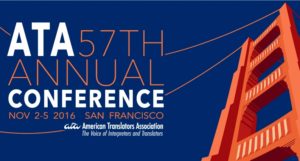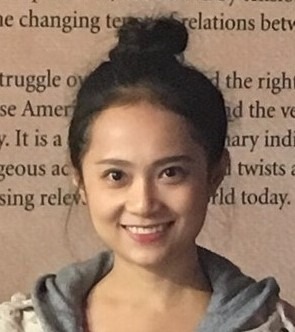A Newbie’s Experience at #ATA57
 Attending conferences can be exciting and nerve-racking at the same time, but with the Newbies & Buddies program at the ATA annual conference, I felt at ease and enjoyed every moment to the fullest. Bonding with three smiling faces through the welcome reception—Farah Arjang, a veteran translator and translation service provider, and Yifan Zhan and Lilian Gao, two graduate students studying Translation and Localization Management at Middlebury Institute of International Studies, I was happy as a clam. Our little group had quite the variety: practitioner, student, and scholar of translation and interpreting.
Attending conferences can be exciting and nerve-racking at the same time, but with the Newbies & Buddies program at the ATA annual conference, I felt at ease and enjoyed every moment to the fullest. Bonding with three smiling faces through the welcome reception—Farah Arjang, a veteran translator and translation service provider, and Yifan Zhan and Lilian Gao, two graduate students studying Translation and Localization Management at Middlebury Institute of International Studies, I was happy as a clam. Our little group had quite the variety: practitioner, student, and scholar of translation and interpreting.
‘Hectic’ is a good word to describe the first day of international conferences for first time attendees. The 57th ATA annual conference was no exception. Luckily, the conference was carefully organized and attended to even the smallest details, such as the suggestion that Newbies have a meal with their Buddies. Compulsory and stiff as it might sound, it did help to take a lot of pressure off the Newbies. Farah briefed us on the basic flow of the conference schedule at the continental breakfast on the first day, so the three of us had a general idea of where to go and what to expect at the sessions to follow. I personally am a big fan of the conference app! I had all my sessions planned out ahead of time and was able to set up alerts. With the guidance of a kind and caring experienced ATA conference attendee and a helpful app, the first day was not all that hectic but instead quite enjoyable.
As a scholar and practitioner of Chinese/English translation and interpreting, I’m always drawn to learning about the Chinese/English language service industry, so I added the session called “Language Services Industry in China: Opportunities and Challenges” to the top of my schedule. It was a pleasant surprise to find out that Dr. Ping Yang, Chief Editor of the Chinese Translators Journal, the most influential academic journal in translation and interpreting studies in China, had been invited to give a talk about the status quo and prospects of translation services and translation studies in China. I’ve met Dr. Yang on many occasions in China, and ATA brought us together once again in the U.S. What a delightful coincidence! The other two speakers, Hui Tao and Yang Yu, introduced translation services in China from the perspective of localization, machine-aided translation technology, and big data analysis. It was definitely eye-opening for me to learn how entrenched technology is becoming in the industry.
The sessions that I looked forward to the most even before I arrived in San Francisco were those related to interpreting ethics, which was the theme of the panel discussion for the Interpreting Division this year. Interpreting ethics is my current research interest. I learned a lot from the panelists, Helen Eby, Milena Calderari-Waldron, Robyn Dean, Christina Helmerichs, and Marina Waters. In Dr. Robyn Dean’s sessions, she deconstructed the notion of the interpreter’s “role” and differentiated the use of the term in sociology and applied ethics. This was very new and insightful, since the interpreter’s role is always the center of discussion regarding the quality of interpreting services, where different metaphors of roles are often used to assess an interpreter’s performance. I had a pleasant short conversation with Dr. Dean afterwards and mentioned to her my questionnaire about interpreters’ decision making processes. She was interested and offer a few words of encouragement. The ATA annual meeting offered a great bridge for young scholars like myself to reach out to established scholars and learn from them.
Time always flies when you’re having fun. In the end, I departed San Francisco feeling extremely grateful. I’m grateful to Farah, whose advice was like a life jacket for newbies to navigate the oceans of opportunities and insight at the conference; to Yifang and Lilian, with whom I braved the air-tight schedule without suffocating as we were bombarded with new information. I’m grateful to all the speakers in the different sessions that painted the picture of a new and promising world of translation and interpreting. Finally, I’m grateful to the conference organizers and volunteers, who produced a successful event, united us for the 57th time, and reminded us that as translators and interpreters, though we are invisible most of the time, we are important, and we do not stand alone.
Author bio
 Mingyue Yin is an assistant professor and Ph.D candidate at Sichuan University in China. She is also a visiting scholar at the Department of Communication Arts at the University of Wisconsin-Madison. Her research interest is in Translation/Interpreting Studies and Language Communication. She is currently working on her doctoral research project, “Interpreter’s Decision Making and Ethics”. Mingyue is also a certified Chinese/English Interpreter through the Chinese Accreditation Test for Translators and Interpreters (CATTI).
Mingyue Yin is an assistant professor and Ph.D candidate at Sichuan University in China. She is also a visiting scholar at the Department of Communication Arts at the University of Wisconsin-Madison. Her research interest is in Translation/Interpreting Studies and Language Communication. She is currently working on her doctoral research project, “Interpreter’s Decision Making and Ethics”. Mingyue is also a certified Chinese/English Interpreter through the Chinese Accreditation Test for Translators and Interpreters (CATTI).
